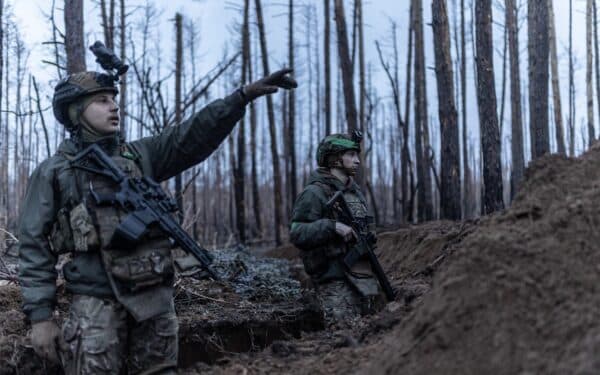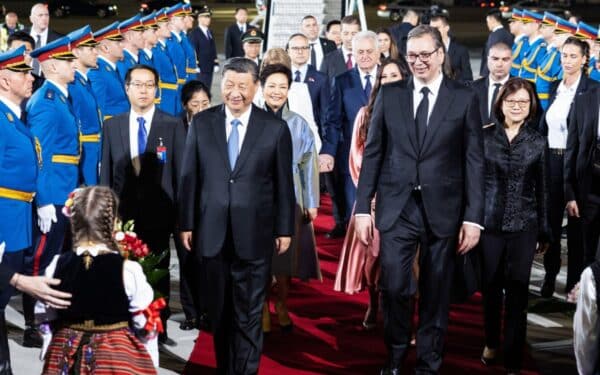“Russia is an occupier”, according to my smudged nightclub stamp.
After dancing a hazy night away in Tbilisi’s legendary techno club, Bassiani, I’m surprised to wake up next morning and find this message inked on my wrist, alongside a black logo symbolising Ukrainian sovereignty.
The content of the Bassiani entry stamp had passed me by in the dark, bustling queue. Yet it seems you cannot escape geopolitics in the small Caucasian nation of Georgia, even when clubbing.
Within hours of arriving in the capital, Tbilisi, I’m struck by the fierce display of solidarity with Ukraine. I drink my first coffee from a paper cup embellished with a Ukrainian flag, before disposing of it in a bin on the street, painted with thick blue and yellow stripes. And the same sign is pinned to the door of dozens of cafes and bars around the city: “Do not enter unless you agree that Putin is a war criminal.”
In contrast, the official government line on Putin’s invasion is markedly soft. Georgia hasn’t imposed any sanctions on Moscow – much to the anger of many living here. Others are more sympathetic to the difficulty their government would have in doing so, given what a menacing neighbour Russia is. Either way, it makes those in Tbilisi all the keener to make their own views on the war known.
Of course, statements about Putin being a war criminal – or Russia an occupier – aren’t just an expression of solidarity with Ukraine, they’re also deeply personal.
Russia’s 2008 invasion of Georgia – which saw South Ossetia added to Abkhazia as regions effectively annexed by Moscow, is still a fresh wound. Thousands of Russian troops remain stationed in these breakaway regions.
Enduring tensions from this war can come to the fore in a not-so-subtle manner during mealtimes. After finishing off a delicious stew in the leafy courtyard of Tbilisi’s Shavi Lomi restaurant, my bill arrives with a message printed at the bottom: “Fact check: 20% of Georgian territory is occupied by Russia. Thank you for your visit!” It’s the same message attached to my pharmacy bill the previous day.
Aside from anger at Moscow’s occupying tendencies, many of Tbilisi’s longer-term residents resent the way in which the war in Ukraine is changing their city.
Since Putin launched his invasion of Ukraine, over 200,000 Russians have fled to Georgia. This huge influx is driving up prices here: countless locals tell me they are being kicked out of their homes as they’re no longer able to afford the rent, which has more than doubled since last February.
Language too, is another source of tension. In a restaurant in Tbilisi’s old town, a large sign in English hangs above the bar: “We don’t speak Russian here.” A woman sitting inside, who moved to Tbilisi as a teenager from occupied Ossetia, is keen to offer an explanation: “For Georgians, Russian is the language of colonial power.” It’s “entitled” of Russians to speak in their native language and simply expect locals to understand, she tells me. “It’s hard not to feel resentful, when you’re from a region where schools are forced to teach lessons in Russian.”
Resentment towards the new wave of Russian migrants is illustrated in graffiti lining the city’s walls: “Russians go home”, “No Russian is welcome here”. Yet graffiti depicts a pushback too: Scrawled underneath the latter motto is a new message: “Not all Russians are Putin.”
Indeed, surely Russians who choose to come here aren’t going to be Putin apologists, I ask locals. Some beg to differ: “They’re just here because they don’t want to give up Instagram and McDonald’s.” In a nutshell, the general consensus among more hardline Georgians is that the new wave of Russians have only come to escape sanctions, not because they care about the sovereignty of Ukraine.
Yet many Russians I come across are only too quick to condemn Putin. I hear stories of the fear and intimidation they faced at anti-war protests in Moscow before fleeing, while others speak about the difficulty of leaving their families behind, after moving here to escape conscription.
I ask them what it’s like to live in a city with such a palpable anti-Russian mood. Some appear unfazed: it’s just a relief to feel safe, they insist, and most Georgians have been friendly.
Others admit that the chilly reception has been difficult, and that walking around a city filled with hostile messages every day is wearing them down. Friends of theirs who fled instead to Armenia – a country which enjoys a more cordial relationship with Russia – have been made to feel “much more welcome.”

Interestingly, I meet Russians and Ukrainians who seem to be mingling – and dating – harmoniously in Tbilisi. I go to parties with guests from both countries, and my local cafe is run by several lively staff, some Russian, some Ukrainian.
Does this offer hope that the tensions will ease between Russians and Georgians too?
Perhaps. Yet as Georgians continue to struggle with rising prices and increasingly unaffordable rent in their home city, it’s hard to imagine that the resentment will dissipate any time soon.
Write to us with your comments to be considered for publication at letters@reaction.life





